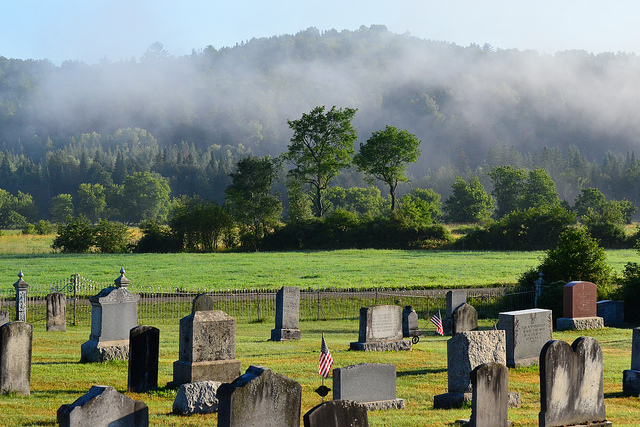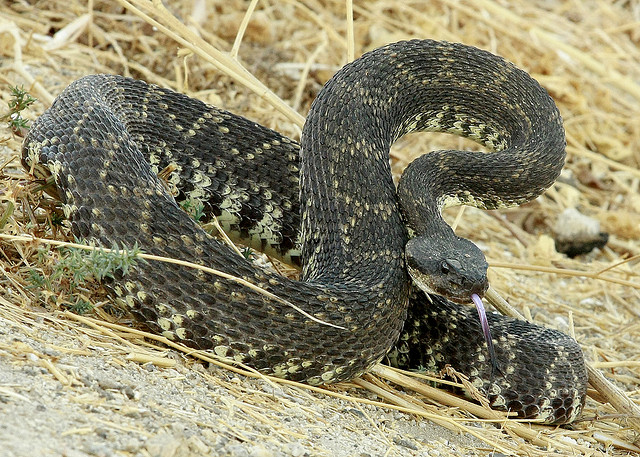Olivia Clare
I drove to the cemetery with the woman who was exactly my mother’s age and who said, “Charlie and Ella. That’s who we’re looking for.” Her boots sat in the backseat of her station wagon as we drove up the short road among long-stemmed wildflowers, headstones, and pillars.
Old graves. From the turn of the century before this one. Names we’d never heard before. Hagerty. Aseneth. Also Eliza. Sarah. We parked the car in the middle of the road and started to walk among them. Graves of real stone, stony stone, present objects of absent lives.
“I wonder if they sell plots here anymore.” The woman shaded her eyes with her hand. Her own name was simple. Mary. I think she was a musician or had tried to be. I didn’t know Mary at all. I came with her because we both were lonely, stranded in the nearest town together—not important why.
“Everyone looks like they’re facing out,” she said about the stones, “like from a stage. Like the last scene in Our Town.”
Mary’s hair was ferny and red, fronds out on both sides in spite of a barrette. She liked to ask me yes-or-no questions not intended to develop into conversations.
Do you like so-and-so’s music?
Yes.
Have you seen such-and-such film?
No.
Were you an only child?
“Is this them?” I said now, looking at a pair of graves. I meant Charlie and Ella.
“No,” she said. “You’ll know them when you see them.”
On the drive over she’d told me she liked to write poems about sex, which made me think of her having sex with a man whose hands get caught in her hair. I tried not to think about sex because I hadn’t had any in a while. I tried not to think of the man I’d told myself I wasn’t supposed to think about, and the thought of nothing more again with him was nauseating.
I could have a drink and feel differently, toasting myself quietly, a toast a different man, a Swedish man, once taught me: “In i dimman.” “Into the fog.” He always drank his wine in one mouthful like a shot, as though he had somewhere to be.
“I just thought of something,” Mary said. “I worry some antique dealer came and stole the grave. They do that sometimes. They get lots of money for them.” Wind arrived and took more hair from her barrette. “Beautiful,” she said. “That’s horrifying.”
“Oh.”
“I can’t believe it.” Mary was distressed, genuinely.
“Maybe you don’t remember what they look like. Or we’re in the wrong place.”
“No, I remember.” She was a little defensive now. “They were right here.”
“Horrifying,” I said neutrally.
“These dealers just come and take something that looks expensive. My god.”
“Horrifying,” I said to myself and meant it, hard to say exactly about what.
“Don’t stop looking,” Mary said. “We have to find them.”
I looked as one scans books in library stacks, as one scrolls on the Internet. I’d been taught to revere the dead as though an incredible misfortune had fallen on them. Rows and rows of Aseneths and Sarahs. Sarahs outnumbered me. I couldn’t see Mary. I was entering a gridlike forest of names of strangers. Strangers, in the context of a cemetery, we were meant to hold to us, abstractly mourn. If you’re lucky, someone stops to look at you.
I ran through the names, terrible speed. Running past a headstone, I already lost it. Sarah indistinguishable from Aseneth. There and not there, like streets rushing elsewhere.
“I found them! I found them!”
I ran to Mary’s voice, readying the camera in my phone.
“Where are you?”
“Over here! You have to see.”
In the first row of pillars and stones, the memorial was a two-foot tall, stage-like platform with two marble children—Charlie and Ella—lying asleep. Like lovers, entwined on a little stone bed on the stage. Ella died in 1857 at 3 months old. Her brother Charlie died at 7 months in 1854.
“Their poor parents.” Mary took a piece of gum wrapped in foil out of her pocket and placed it on the stone. “I like to bring them something when I come,” she said. And then on the drive back while she looked at a map she took out another piece of gum and put it in her mouth.
A year later I ran into the Swedish man at a party. We slept together that night in a small hotel in New York City. He’d gained ten or fifteen pounds and had new glasses, was almost unrecognizable, and after sex, he wrapped a serious arm around me. When he fell asleep, I got up and put on my clothes and snuck out, although it was four in the morning and there was nowhere I could go.
Olivia Clare is the author of a short story collection, Disasters in the First World, from Black Cat/Grove Atlantic. She is also the author of a book of poems, The 26-Hour Day (New Issues, 2015). Her fiction has appeared in Granta, n+1, Boston Review, Southern Review, and The O. Henry Prize Stories 2014, among other publications. Her poems have appeared in Poetry, Southern Review, London Magazine, FIELD, and elsewhere. She holds master’s degrees from the Iowa Writers’ Workshop and the University of Southern California, as well as a PhD from the University of Nevada. She is an Assistant Professor in Creative Writing at Sam Houston State University. Find out more at Olivia-clare.com, or follow her on Twitter @olivia_clare_



